

6 Innovations in Social Emotional Learning. Social emotional learning “teaches the skills we all need to handle ourselves, our relationships, and our work, effectively and ethically,” says Collaborative for Academic, Social, and Emotional Learning (CASEL).
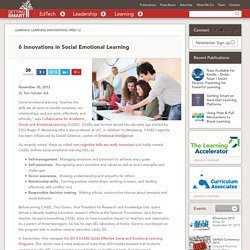
CASEL was formed almost two decades ago started by CEO Roger P. Weissberg who is also professor at UIC. In addition to Weissberg, CASEL’s agenda has been influenced by Daniel Goleman, author of Emotional Intelligence. As recently noted, these so-called non-cognitive skills are really important–just badly named. Lessons from the Field: Teaching Foundational Life Skills Through Baseball. Summer heat, eating hot dogs, and cheering for home runs -- it's baseball season once again.
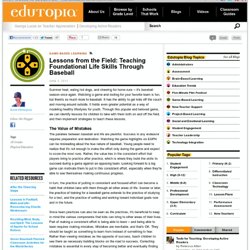
Watching a game and rooting for your favorite team is fun, but there's so much more to baseball. It has the ability to get kids off the couch and moving around outside. It holds even greater potential as a way of modeling healthy lifestyles for youth. Through this popular and beloved game, we can identify lessons for children to take with them both on and off the field, and then implement strategies to teach these lessons.
The Value of Mistakes The parallels between baseball and life are plentiful. In turn, the practice of putting in consistent and focused effort can become a habit that children take with them through all other areas of life. Since team practices can also be seen as life practices, it's beneficial to keep in mind the various components that kids can bring to other areas of their lives. The Real Meaning of Winning The learning opportunities don't end with team practices. Developing Character, Courage & College Readiness. Leaders often cut their own path.
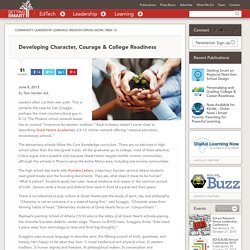
That is certainly the case for Dan Scoggin, perhaps the most countercultural guy in K-12. The Phoenix school network leader has an unusual “reverence for western tradition.” Back-to-basics doesn’t come close to describing Great Hearts Academies, a K-12 charter network offering “classical education, revolutionary schools.” The elementary schools follow the Core Knowledge curriculum. There are no electives in high school (other than the latin/greek track). The high school day starts with Humane Letters, a two-hour Socratic seminar where students read great books and the founding documents. There is no reference to pop culture at Great Hearts–just the study of spirit, law, and philosophy. Raphael’s painting School of Athens (1510) adorns the lobby of all Great Hearts schools–placing the Aristotle-Socrates dialectic center stage.
Scoggins uses unusual language to describe aims: the lifelong pursuit of truth, goodness, and beauty. Kern Convening. Video Games and Social Emotional Learning. A lot of talk, press, and focus in this era of learning is on common core standards and 21st century skills and literacies.
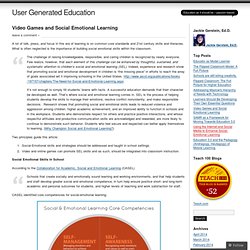
What is often neglected is the importance of building social emotional skills within the classroom. The challenge of raising knowledgeable, responsible, and caring children is recognized by nearly everyone. Few realize, however, that each element of this challenge can be enhanced by thoughtful, sustained, and systematic attention to children’s social and emotional learning (SEL). Indeed, experience and research show that promoting social and emotional development in children is “the missing piece” in efforts to reach the array of goals associated wit h improving schooling in the United States. Not enough to simply fill students’ brains with facts.
Two principles guide this article: What is Social-Emotional Learning (SEL)? Examples, Benefits. We live in a stressful world, and our nation’s children and young adults are coping with new and prevalent emotional realities we can’t ignore.
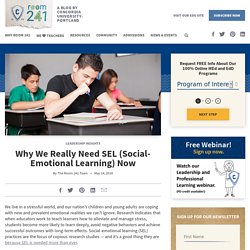
Research indicates that when educators work to teach learners how to alleviate and manage stress, students become more likely to learn deeply, avoid negative behaviors and achieve successful outcomes with long-term effects. Social-emotional learning (SEL) practices are the focus of copious research studies — and it’s a good thing they are because SEL is needed more than ever.
So just what is social-emotional learning? And more importantly, why do we need it? Read on. What is the definition of SEL? Social-emotional learning is generally broken down into five categories Retrieved from Self-awareness Self-awareness is being able to recognize and comprehend one’s emotions and how they translate into our behaviors. Self-management Self-management takes self-awareness one step further into the ability to regulate one’s feelings and behaviors. 5 Guiding Principles of Social and Emotional Learning. According to CASEL, social-emotional learning can be defined as: “the process through which children and adults acquire and effectively apply the knowledge, attitudes, and skills necessary to understand and manage emotions, set and achieve positive goals, feel and show empathy for others, establish and maintain positive relationships, and make responsible decisions.”

While students’ emotional well-being and social skills has always been on educators’ radar, recent years have witnessed a shift towards a stronger focus on SEL in the classroom. Researchers have come to understand the connections between academic performance and SEL, as well as the importance of attending to the many facets of student learning experiences in an effort to educate the whole child. Social Emotional Learning.